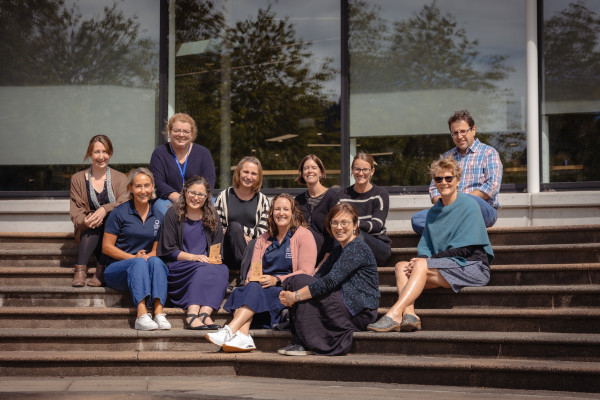- Tūhono home Hoki ki Tūhono
-
- Staff Directory
- Chief Executive Office Auckland International Office Corporate Services Finance Campus Services Functions and Catering Information Systems and Support Marketing, Communications and Engagement Learner Journey Academic Registry International Learner Services Te Punaka Ōwheo
- Learner Experience Academic Excellence Central Campus College of Community Development and Personal Wellbeing College of Engineering, Construction and Living Sciences College of Health College of Work Based Learning Open Education Resource/OERu Research and Postgraduate Studies Te Maru Pumanawa | College of Creative Practice and Enterprise
- Māori Development and Kaitohutohu Office People, Culture & Safety People and Culture Childcare Centre Te Ama Ako | Learning and Teaching Development Wellbeing and Safety Auckland Staff Directory Executive Office Academic Corporate Services Marketing and Business Development Human Resources Campus Quality and Programme Development
-
 Our people make a better world
Our people make a better world
We build the capabilities of individuals, organisations and communities and help them to realise their potential.
Staff Directory
-
- Tools
- Academic Integrity Declaration Form AIC applications dashboard Approved programmes Approved programme fees Centralised assessement repository Chemwatch Course evaluation and surveys CRM applications CRM customer service hub Delegations policy/process Disability and neurodiversity Dynamics 365 (CRM) EBS Ontrack EBS Report Email security personal portal Employment Matters / Solarworkplace / Performance reviews eTaxi eTV
- Financial variance reporting Hidden Disabilities Sunflower programme FCM travel intranet InPlace International entry requirements Knowledgebase articles Learner support dashboards Linkedin Learning Log a job with Marketing Login as an applicant Media consent form Microsoft 365 Moderation App Moodle OP Docs OP Docs - Publishing OP Image Libraries Performance Excellence Portal Product Evaluation Panel
- Policy Library Privacy Programme and course design/development Qualtrics XM RDS Remote access support portal Research Database Robertson Library Staff FAQs about graduation Status of Programmes Student intranet (Kāpehu) Study Abroad info for learners Taha Talks (videos for students) Tūhauora I Wellbeing resources Uniprint Vault Webexpenses Auckland tools
-
 Vault
Had an accident or near miss?
Log it here
Vault
Had an accident or near miss?
Log it here
-
- Communities
- Community AI Steering Committee Ally Network EBS Community of Interest EdTech Champions Health & Wellbeing Research Internal Evaluation Neurodiversity Professional Team Professoriate Proud@OP Student Support Website Advisory Group Web Champions Working under the Rainbow Project Learner Capability Trade Training Centre
- Committee Academic Committee Animals@OP Diversity and Equity Doctor of Professional Practice Committee Kaunihera Whakahaere - Leadership Council Internal Evaluation Learning & Teaching Leadership Team Library Committee Mental Health and Wellbeing Advisory Group Otago Polytechnic Board of Directors Pastoral Care Code Committee Programme Approvals Committee Research and Postgraduate Committee Research Ethics Committee Staff Subcommittee
- Think Tanks Mātauraka Our learners achieve educational success Pūtea Our financial success Tākata Our people, our team, our community Tiriti Our active commitment as a Treaty partner Tūroa Our commitment to be a sustainable and responsive organisation
-
 Create a community
Create a community
Do you have a community, committee or project that you'd like represented here?
Communities
-
- About OP
- Keep up to date All news All events All notices All blogs Share your info Create a news article Create an event Create a notice Create a blog
- Community and Partnerships Alumni and friends Education Foundation Operational information Academic calendar 2025 Academic calendar 2026 Current vacancies Dunedin campus map Our policies Topical FAQs
- Who we are About OP Commemorative sites Māori Strategic Framework OP merchandise Our history Our strategic priorities Pasifika Strategic Framework (2025-2030) Vision and Values Working for us OP job opportunities Wellbeing Calendar Working at OP
-
New Zealand: 0800 762 786
contact us
International: +64 3 477 3014
Just another approach: New Zealand occupational therapists' use of adventure therapy
Author: Helen Jeffery
Supervisors: Jo Straker Linda Wilson
Just another approach: New Zealand occupational therapists' use of adventure therapy
Helen Jeffery
2 December 2014
Abstract
Adventure therapy is an intervention increasingly used in facilities providing services for people wishing to make psychological change, most commonly adolescents and young adults. This research explores New Zealand occupational therapists' use of adventure therapy to ascertain the fit between occupational therapy as a profession and adventure therapy as it is known in New Zealand.
This was a qualitative descriptive study designed to capture the perspectives of New Zealand occupational therapists who utilise adventure therapy in their work. The practice and use of theory of seven therapists recruited through snowballing was explored through semi-structured interviews. Data analysis revealed therapists believe there are many features of adventure therapy theory and practice that are shared with occupational therapy as well as many differences. Occupational therapists can actively manage the differences between the two fields to ensure they are using adventure therapy appropriately in their occupational therapy work.
Adventure therapy's use of activity as therapeutic intervention is different from occupational therapy's broader holistic view of the individual as an occupational being. Participants' observations and the literature reviewed describe adventure therapy using prescribed and unfamiliar activities in novel environments to provide challenge with an element of perceived risk. The intent is to allow the client to develop insight into their usual, possibly maladaptive, responses to challenge and try new ways of responding. Occupational therapy in contrast generally focuses on the client's everyday activities in familiar environments, has a more pragmatic approach and works on real life problems. In occupational therapy intervention, engagement in the activity may be viewed as a therapy in itself, whereas in adventure therapy debriefing the activity is an essential component of the process. Adventure therapy is often directed at the group as a whole, whereas occupational therapy will have more of an emphasis on the individuals, even within settings where groups are facilitated.
Theoretical concepts and practice in the two fields are based on shared beliefs on the therapeutic use of activity and the influence of occupation and environment on health and wellbeing. Occupational therapists can use adventure therapy as an approach in similar ways that they use other approaches to occupational therapy intervention. Occupational therapists bring specialist knowledge and skills in activity analysis and adaption, and in understanding the individuals overall environment which increases potential for transfer of learning.
Occupational therapists are well positioned to use adventure therapy as it is known and practiced in New Zealand. It is recommended that occupational therapists be explicit to employing facilities about the similarities and differences between the two fields, and claim the additional expertise that occupational therapists have in using adventure therapy as an approach. Occupational therapists can consider adventure therapy as a legitimate approach to intervention or tool that they can use enhanced by additional theoretical knowledge about experiential learning and either training in the adventure activity skills or partnership with qualified adventure activity instructors.
Helen's research was supervised by Jo Straker and Linda Wilson.
Licence
This work is licensed under a Creative Commons Attribution licence CC BY 4.0 International.
